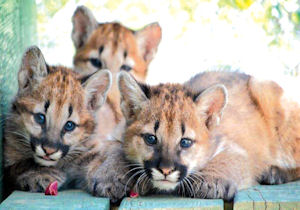After a decade of closure, the Wildlife Waystation is aiming to open its doors to the public once again, a move which could save the 160-acre animal sanctuary from shutting down. This year, the long-standing refuge, which houses more than 400 animals, is dedicating its efforts to funding upgrades needed to meet the required city standards. To date, revisions have included resurfacing the roads, electrical upgrades and achieving required licensing. The process has been slow and steady and Martine Colette, the nonprofit’s founder and director is hopeful it will be completed by the end of the year. “This year, I would like to be in a position to apply for a conditional use permit and, more importantly, I would like to get it,” she said. Colette said it could cost anywhere from $200,000 to $250,000 to get the 36-year-old facility, which employs about 45 workers, up to code. Fundraising has been an ongoing struggle for the sanctuary. Caring and feeding the animals — which range from lions and monkeys to lamas and hyenas — costs some $1.5 million annually. While Colette is relying on fundraising events and ongoing programs to pay for the various revisions, she also is considering “inviting someone to merge with the Wildlife Waystation to elevate its financial status.” “Without having some kind of influx of funds I doubt that we would be able to survive the next six to 12 months,” she said. Colette declined to disclose prospective partners. The facility closed to the public 10 years ago, when the county ordered upgrades on the grounds, including its roads and water and sewage systems. The past decade has been a constant struggle to stay up to date on state and county regulations, Colette said. “With an aging facility there are always new repairs to be made, newer standards to comply with and the basic maintenance just gets heavier,” she said. Keeping up with the continuous maintenance was made even harder by the lack of funds generated from functioning as a public attraction coupled with the economic recession. To date, the Waystation generates roughly $2 million in donations and funds annually —which just covers the “bare bones” of the operations. This is significantly lower than the some $3 million the nonprofit received five years ago. “Donations almost dried up,” said Bruce Kuhn, who assists with the Waystation’s fundraising efforts. Because the nonprofit relies on the donations, memberships and fundraising events, the flow of funds is often inconsistent and unpredictable, Kuhn said. The organization has had to rely on fundraising campaigns such as its fundraising Discount Coupon Book it has been producing for the past five years. Partnering with some 115 Valley businesses, the books are given on consignment to any nonprofit organization looking to raise funds. Half of the proceeds of every book sold are kept by the nonprofit while the other half goes to the Waystation. To date, the coupon books have helped generate some $600,000 for the Waystation, Kuhn said. Additional fundraising efforts have included safari brunches, art shows, barbeques and casino night events, Colette said. Currently, the Waystation has no events planned as there are no spare funds to put one together. Financial challenges have not been the only issues faced by the Wildlife Waystation. Over the years, the refuge has faced scrutiny and legal battles over health and safety violations. While the negative press may have been detrimental to the facility, Colette said she chooses to not dwell on the past. “There’s nothing we can do to counteract (negative press),” Colette said. “All we can do is move forward in a positive manner.” Reopening the facility will offer the Waystation a new beginning and offer it some stability by generating regular revenue, Colette said. The Wildlife Waystation will offer tours and educational programs. Colette hopes reopening will build awareness of the Waystation and, once again, offer up-close and personal opportunities to be near wild and exotic animals. “We’ll have people to take you on a tour, show you the animals, give you the background and immerse you into the lives of these animals,” she said. “It gives people a different perspective.” The Waystation has taken to social media outlets such as Facebook to spread the word on its plans to revitalize and save the longstanding facility. The nonprofit’s photos of its animals — including Zahara, the kit-fox and Rowdy the monkey — have Wildlife Waystation supporters buzzing. “I honestly love the Wildlife Waystation,” posted Vaudree Ortega Chacon. “It is the most peaceful, caring, loving, stress-free environment, and I would advise everyone to volunteer over here. It’s an amazing experience and the people are great and most of the animals are very adorable and friendly.”
